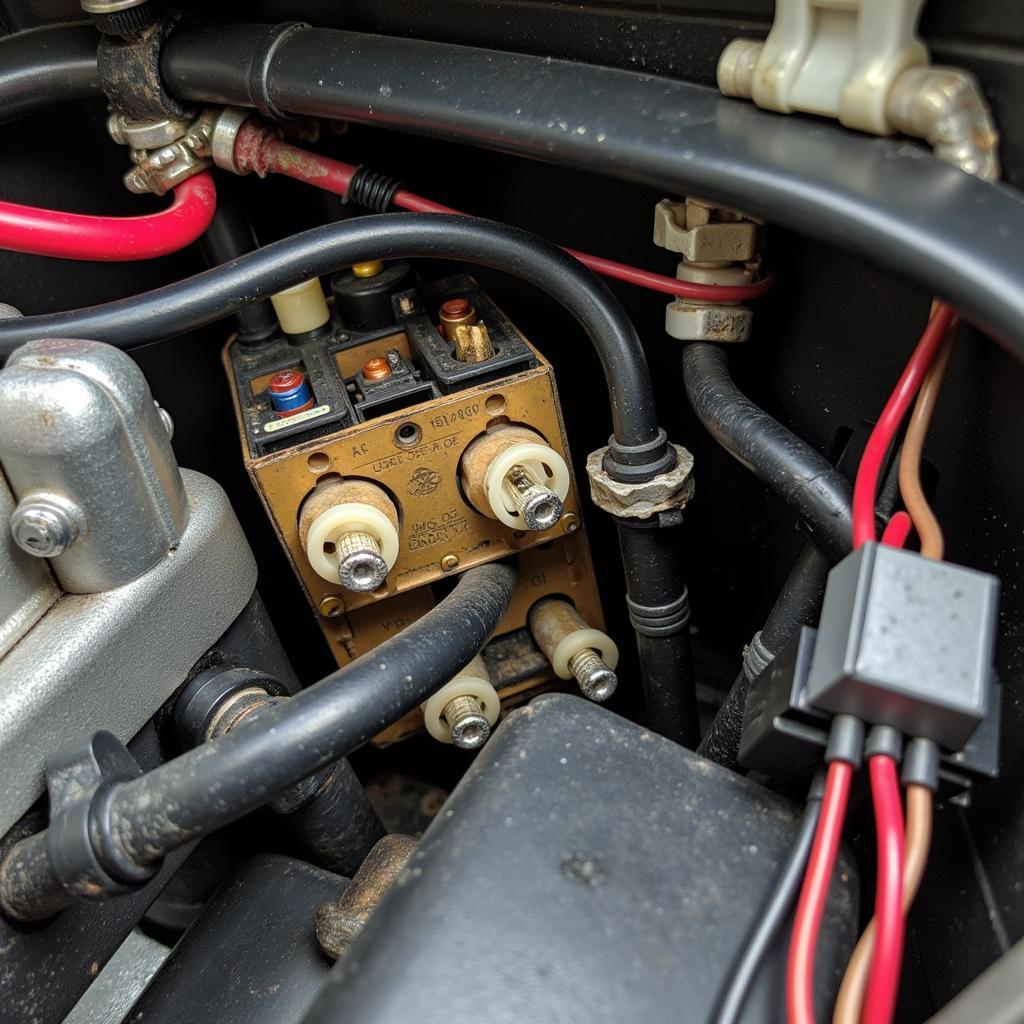Summer’s scorching heat is no joke, especially when your car’s AC decides to take a vacation. A malfunctioning AC system can quickly turn a comfortable drive into a sweaty ordeal. But don’t despair! This comprehensive guide will equip you with the knowledge and resources to diagnose and potentially fix your car’s AC woes, saving you time and money.
After this introduction, we’ll dive into the common causes of AC failure and provide practical solutions you can explore. If you’re unsure whether you should tackle the repair yourself, check out should you fix your car’s ac.
Understanding Your Car’s AC System
Before we jump into troubleshooting, let’s quickly review the essential components of a car’s AC system. Understanding how these parts work together is crucial for effective diagnosis and repair. The main players are the compressor, condenser, evaporator, expansion valve or orifice tube, and the receiver-dryer or accumulator. These components work in harmony to circulate refrigerant, absorb heat, and distribute cool air throughout your vehicle.
Common AC Problems and Solutions
Several issues can plague a car’s AC system. Let’s explore the most frequent culprits and how to address them.
Low Refrigerant
One of the most common causes of a weak AC is low refrigerant. This can be due to leaks in the system. Identifying and sealing these leaks is critical before recharging the system.
- Signs of low refrigerant: Weak airflow, warm air blowing from vents, hissing sounds.
- Solution: Locate and repair leaks using a leak detector dye. Then, recharge the system with the appropriate refrigerant, following the manufacturer’s instructions.
Faulty Compressor
The compressor is the heart of the AC system, responsible for circulating the refrigerant. A failing compressor can completely shut down the AC.
- Signs of a faulty compressor: Loud noises (clunking, grinding), no cold air, or the clutch not engaging.
- Solution: Compressor replacement is often necessary. This is a more complex repair and may require professional assistance.
Electrical Issues
Electrical problems can affect various components, such as the blower motor, compressor clutch, or control switches.
- Signs of electrical issues: Blower motor not working, compressor not engaging, or malfunctioning control panel.
- Solution: Check fuses, relays, and wiring connections. A multimeter can be helpful for diagnosing electrical faults.
 Car AC Electrical Issues
Car AC Electrical Issues
Clogged Condenser
The condenser releases heat from the refrigerant. A clogged condenser restricts airflow and reduces cooling efficiency.
- Signs of a clogged condenser: Reduced cooling performance, higher than normal pressure readings.
- Solution: Carefully clean the condenser fins with a fin comb or compressed air.
Thinking of fixing it yourself? Learn more at diy fix car ac.
Blocked Evaporator
The evaporator absorbs heat from the cabin air. A blocked evaporator can restrict airflow and prevent proper cooling.
- Signs of a blocked evaporator: Weak airflow, musty odor from vents.
- Solution: Cleaning or replacing the evaporator core may be necessary.
“A properly functioning AC relies on the seamless interaction of all its components,” says John Miller, Senior Automotive Technician at Miller’s Auto Repair. “A thorough inspection is crucial for accurate diagnosis and effective repair.”
How Much Will it Cost?
Repair costs can vary greatly depending on the issue. For a better understanding of potential expenses, visit how much does it cost to fix your car’s ac. You can also find local repair shops at ac car leak fix near me.
Conclusion
Fixing your car’s AC can seem daunting, but with a systematic approach, you can often pinpoint the problem and explore solutions. Remember, regular maintenance can prevent many AC issues. “Preventive maintenance is key to a long-lasting and efficient AC system,” advises Sarah Johnson, lead mechanic at Johnson’s Automotive. “Regular checks can save you from costly repairs down the road.” This guide has provided a starting point for troubleshooting your car’s AC. If you’re unsure about any step, consulting a qualified mechanic is always recommended. For further assistance, connect with AutoTipPro at +1 (641) 206-8880 or visit our office at 500 N St Mary’s St, San Antonio, TX 78205, United States. We’re here to help you beat the heat and enjoy a comfortable ride!
FAQ
-
What is the most common reason for car AC failure? Low refrigerant due to leaks is a frequent culprit.
-
How often should I recharge my car’s AC? Recharging should only be done if there’s a leak. A properly sealed system shouldn’t require frequent recharges.
-
Can I recharge my car’s AC myself? Yes, but it requires the proper equipment and following safety precautions.
-
What are the signs of a bad AC compressor? Loud noises, no cold air, or the clutch not engaging.
-
How can I prevent AC problems? Regular maintenance, such as checking refrigerant levels and inspecting components, is crucial.
-
How do I know if my car’s AC needs professional repair? If you’re unsure about any aspect of the repair process, it’s best to consult a qualified mechanic.
-
Where can I find reliable car AC repair near me? Searching online for “AC car repair near me” can provide local options. You can also try how to fix your cars ac.







Leave a Reply